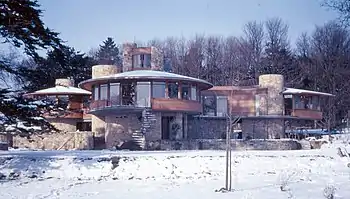Roy Clarke
Royston Clarke OBE (born 28 January 1930), usually known as Roy Clarke, is an English comedy writer best known for creating the sitcoms Last of the Summer Wine, Keeping Up Appearances, Open All Hours and its sequel series, Still Open All Hours.
Royston Clarke | |
|---|---|
| Born | 28 January 1930[1] Austerfield, West Riding of Yorkshire, England |
| Occupation | Scriptwriter |
| Period | 1968–present |
| Genre | Television |
| Subject | Sitcom, comedy |
| Notable works | The Misfit (1970–71) Last of the Summer Wine (1973–2010) Oh No It's Selwyn Froggitt (1974) The Growing Pains of PC Penrose (1975) Open All Hours (1973, 1976–85) Rosie (1977–81) Potter (1979–83) The Magnificent Evans (1984) Mann's Best Friends (1985) The Clairvoyant (1986) Pulaski (1987) First of the Summer Wine (1988–89) Keeping Up Appearances (1990–95) Don't Tell Father (1992) The Wanderer (1994) Ain't Misbehavin' (1994–95) Still Open All Hours (2013–present) Young Hyacinth (2016) |
Early life
Clarke was born in Austerfield in the West Riding of Yorkshire. His jobs before becoming a writer included teacher, policeman, taxi driver, salesman and he was a soldier in the Royal Corps of Signals of the British Army.[2]
Career
In the late 1960s Clarke wrote thrillers for BBC Radio. The first in January 1968, The 17-Jewelled Shockproof Swiss-Made Bomb, featured Peter Coke, Ben Kingsley, Bob Grant and Anne Stallybrass. A couple of months later. The Events at Black Tor was a police thriller which also featured Bob Grant along with James Beck.
Clarke was the sole writer of Last of the Summer Wine, which at its peak had an audience of over 18 million viewers. During its long run it featured Bill Owen, Peter Sallis, Brian Wilde, Kathy Staff and Dame Thora Hird in leading roles. Clarke was not involved in casting the actors, but he wrote the character named Clegg with Sallis specifically in mind.[3]
He also wrote a prequel, First of the Summer Wine, The Misfit, starring Ronald Fraser; Open All Hours, starring Ronnie Barker and David Jason; Keeping Up Appearances, starring Patricia Routledge; and Ain't Misbehavin'.
Clarke created and wrote the short-lived fantasy drama, The Wanderer starring Bryan Brown, for Sky One. He also created the sitcom Oh No, It's Selwyn Froggitt! in 1974, writing the pilot episode, though Alan Plater wrote the eventual series. Clarke has worked in film penning the screenplay to Hawks (1988)[4] and he wrote the well received drama A Foreign Field (1993).[5]
In 2003, Clarke adapted his Last of the Summer Wine chronicle The Moonbather for a world premiere performance at the Scunthorpe Little Theatre Club.[6]
In 2002, he received an OBE for his contribution to British comedy. In 1994, Clarke was granted the Freedom of the Borough of Doncaster; the highest honour the Council can bestow. He was awarded the lifetime achievement award at the 2010 British Comedy Awards.
In 2013, he resurrected Open All Hours for a sequel series, Still Open All Hours starring David Jason. So far six series have been broadcast.[7][8]
In 2016, he created a prequel to Keeping Up Appearances titled Young Hyacinth. The one-off episode premiered on 2 September 2016 on BBC One.[9]
Personal life

Clarke resides in rural Goole in the East Riding of Yorkshire with his wife, Enid Kitching.[1] For some years he owned Horton Rounds in Northamptonshire, a Grade II listed house designed by the Northamptonshire architect Arthur A. J. Marshman.[10]
See also
References
- Researcha
- Roy Clark at screenonline. Retrieved 25 January 2015
- Roy Clarke Interview at Mirror News. Retrieved 26 January 2015
- Radio Times guide to film 2016. London: Radio Times. 2015. p. 552. ISBN 9780992936426.
- "Roy Clarke (1930-)". BFI Screenline. Retrieved 5 June 2016.
- "Little Theatre Club Chronology". Scunthorpe Little Theatre Club. Retrieved 23 July 2007.
- "Still Open All Hours commissioned for full series". BBC News. 30 January 2014. Retrieved 31 January 2014.
- "BBC commissions full series of Still Open All Hours". The Guardian. 30 January 2014. Retrieved 31 January 2014.
- "Young Hyacinth". BBC Media Centre. 17 August 2016. Retrieved 22 August 2016.
- Historic England. "Horton Rounds and associated steps, walls and lamp posts (1407987)". National Heritage List for England. Retrieved 10 November 2019.
External links
- Roy Clarke at IMDb